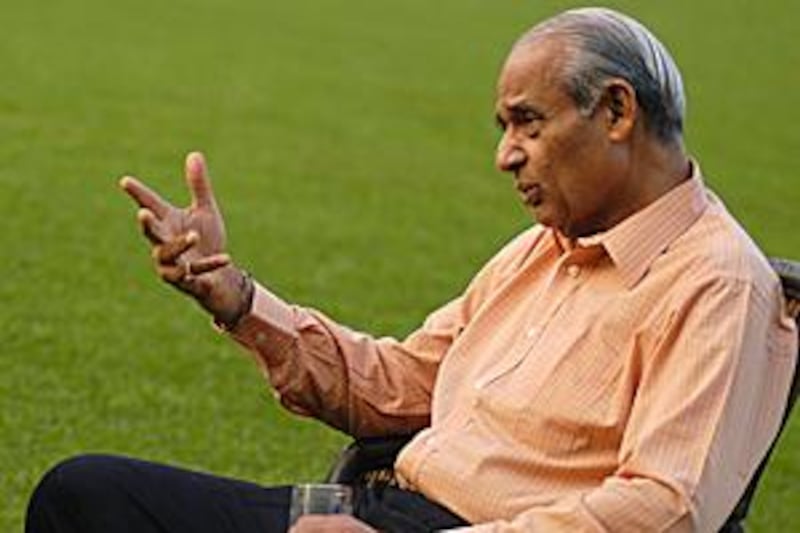Indian cricket lost a great man both on and off the field of play at the weekend when Raj Singh Dungarpur died. A pillar of strength when the game in the country was in crisis and someone who was gracious in both victory and defeat, he will be sorely missed by everyone who knew him. Dungarpur passed away on the Saturday and it was only 24 hours earlier that India had nudged South Africa out of top spot in the ICC one-day internationals rankings. Only an angel's whisper could have informed him about a development that was a real boost for Indian cricket, but it is somehow fitting that he lived to see the day.
Dungarpur wore many hats. They went in this order - selector, team manager, chairman of selectors, Board of Cricket Control for India (BCCI) president and BCCI advisor. Whatever job he did, he gave it all he had and he must take some of the credit for the current healthy state of the game in his homeland. But rankings can be superficial and the goal for the national team must now be for the side to gain domination - something Dungarpur would have recognised.
In fact, it took only one loss for India to slide to third in the ODI rankings after Saturday's loss to Sri Lanka in a group game in their triangular series. By Monday, India moved back up to second in the rankings after they achieved a remarkable hat-trick of tournament wins in Sri Lanka, something which has never been achieved by a team before. Putting a foot on the upper deck of international cricket was not something even the most optimistic of Indian fans would have imagined two years ago, after the team were knocked out of the World Cup in the Caribbean in the first round; Sri Lanka and Bangladesh qualifying for the Super Eights at India's expense.
But India regrouped remarkably and Mahendra Singh Dhoni's men have rarely looked back since they won the CB Series in Australia in 2008. So what has brought about India's transformation? From what I hear, it is the congenial dressing room atmosphere created by the staff. Gary Kirsten has had a superlative effect on the players, a far cry to what was experienced in the Greg Chappell years from 2005 to 2007. Things in those days were at a real low point when it came to harmony within the camp.
On top of terrific coaching, this team have a good mix of players with different attributes and if the selectors develop a stronger reserve to ensure India do not suffer from an Australia-like situation - when the senior players decide enough is enough - it could lead to a long run at the top for India. I would suggest that day is not far away with a continued wise and ruthless selection system holding the key.
If Indian cricket can learn anything from Dungarpur it is from his time as a successful selector because he gave youth ample space in his selection policies. He dropped a veteran like Mohinder Amarnath in 1988, which resulted in Amarnath calling the selectors a "bunch of jokers". History tells us India coped with Amarnath's absence and in 1989, Dungarpur picked a 16-year-old Sachin Tendulkar to make his debut against Imran Khan's fiery pace attack.
And so it continued. Mohammed Azharuddin was offered the India captaincy in 1990 by Dungarpur via a casual "Want to be captain?" question at a training session. Azharuddin went on to become one of India's most successful captains. Tendulkar did not take time to emerge as the shining star of world cricket and Dungarpur's dream of an Indian "Team of the 1990s" suddenly made sense. By the time Dungarpur became board president in 1996, he knew which ends needed tightening in Indian cricket.
He roped in consultants like Bob Simpson and provided the national team with their first trainer. Those appointments did not end up being very successful because the coach of the team was still indigenous. In the end, he was convinced that there was no gain in appointing an Indian coach, who invariably had an axe to grind. In 2000, as BCCI counsel, he was instrumental in getting John Wright to be India's first foreign manager from a choice which included Chappell and Geoff Marsh, who refused the job after going through India's busy international schedule.
India are still benefiting today from decisions men like Dungarpur took a decade ago. But in a personality-dominated country, we still sometimes forget those who just got on with things. Something needs to be done to perpetuate the memory of Raj Singh Dungarpur, and it needs to be done now. Clayton Murzello is Group Sports Editor of Indian newspaper Midday sports@thenational.ae





